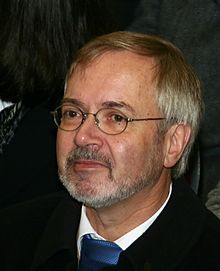Werner Hoyer
| Werner Hoyer | |
|---|---|
 |
|
| President of the European Investment Bank | |
|
Assumed office 1 January 2012 |
|
| Preceded by | Philippe Maystadt |
| Personal details | |
| Born |
17 November 1951 Wuppertal, West Germany (now Germany) |
| Political party | Free Democratic Party |
| Alma mater | University of Cologne |
Werner Hoyer (born 17 November 1951 in Wuppertal) is a German politician of the liberal Free Democratic Party of Germany (FDP), currently serving as the President of the European Investment Bank.
Hoyer graduated as an economist at the University of Cologne in 1974, and worked as a scientific assistant there until 1984. He earned a doctorate in economics in 1977, with a dissertation called Vermögenseffekte des Geldes – Theoretische Ansätze zur Rolle des Geldes als Vermögensobjekt im Wirtschaftsprozess (Wealth Effects of Money – Theoretical Approaches to the Role of Money as a Capital Property in the Economic Process). From 1985 to 1987, he worked with the Carl Duisberg Society in Cologne. He taught international economics at the University of Cologne until 1994. Hoyer is a member of the Union of European Federalists (UEF). He is married and has two children.
In 1972, he became a member of the FDP, and was a board member of the Young Liberals from 1983 to 1986. He chaired the local party board in Cologne from 1984 to 1992, and became a member of the FDP board in North Rhine-Westphalia in 1984 and the federal FDP board in 1994. He was Secretary General of his party from 1993 to 1994. From 1997 to 2000, he was Vice President and from 2000 to 2005, President, of the European Liberal Democrat and Reform Party.
Hoyer has been a member of the Bundestag since 1987, and served as chief whip from 1989 to 1993 and his party's spokesman for security policy from 1990 to 1994. From 2002 to 2009, he was deputy chair of the FDP parliamentary group in the Bundestag. Between 2005 and 2009, he also served as Deputy Chairman of the German-American Parliamentary Friendship Group.
Minister of State at the Federal Foreign Office, 1994–98
From 1994 to 1998, Hoyer was Minister of State at the Foreign Office in the Fifth Cabinet Kohl under Foreign Minister Klaus Kinkel. In this capacity, he was the German representative in a high-level working group chaired by Spanish foreign minister Carlos Westendorp and set up to prepare the negotiations on treaty change which led to the Treaties of Amsterdam and subsequently, Nice. In 1996, he was the German negotiator during an intergovernmental conference in Turin that was aimed at improvements in the European Union's decision-making processes, including the establishment of a High Representative of the Union for Foreign Affairs and Security Policy. He also repeatedly reiterated German determination to enter a single currency – the Euro – by 1999.
...
Wikipedia
